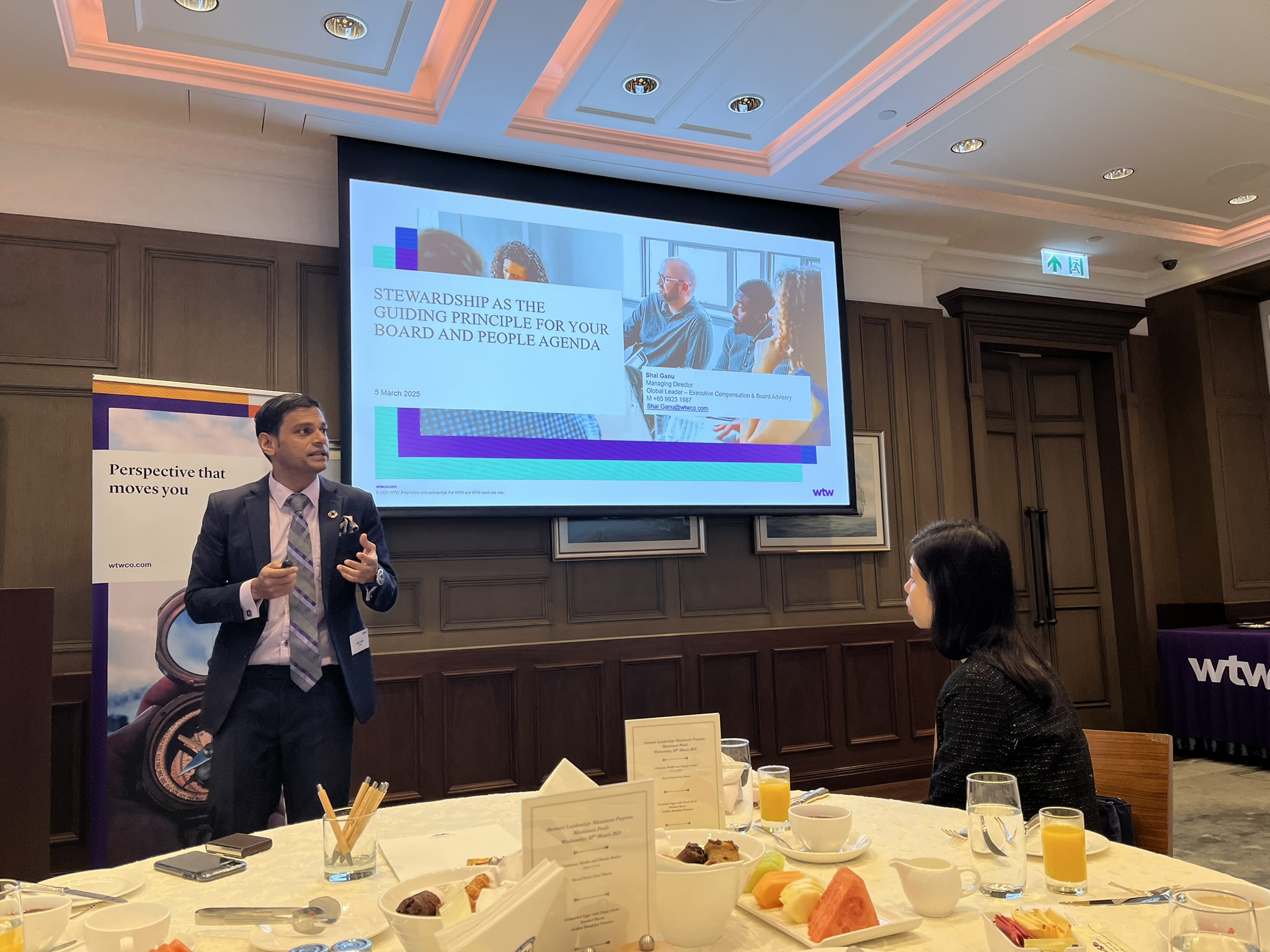
In a world where corporate survival hangs by a thread, the old rules of business are being rewritten—and HR is at the epicentre of this transformation. At a recent sharing session at the American Club in Hong Kong, global thought leaders Shai Ganu, Managing Director, Global Leader—Executive Compensation & Board Advisory, Willis Towers Watson and Rajeev Peshawaria, CEO, Stewardship Asia Centre, challenged traditional business paradigms with a revolutionary approach for HR and C-suite executives to drive their organisations, talent and communities via steward leadership.
The traditional corporate model, where profits reign supreme, is rapidly becoming obsolete. Today's most successful organisations understand that long-term sustainability requires a more holistic approach that balances financial performance with social responsibility. Globally, there are stark variations in corporate Environmental, Social and Governance (ESG) priorities. North America has historically focused on social issues like diversity and inclusion, although Trump’s latest policies look set to skew this. Europe emphasises environmental challenges, particularly reductions in carbon emissions. Meanwhile, Asia Pacific has concentrated on enhancing governance standards. Ganu highlighted that 81% of top global companies now align executive incentives with ESG goals; however, in most cases, such alignments remain qualitative, rather than linked to implementing meaningful, rigorous, quantitative measurements.
Steward leadership is a transformative approach that helps HR and C-suite leaders move their organisations beyond mere compliance. The model recommends that businesses view themselves as custodians of broader societal interests, rather than just profit-generating organs. Peshawaria noted that at its core, steward leadership revolves around three fundamental steps:
- Incorporating specific values within organisational culture
- Defining a clear, meaningful purpose
- Making decisions consistently aligned with those values and purpose
As the current business environment shifts from volatile, uncertain, complex and ambiguous (VUCA) to brittle, anxious, non-linear and incomprehensible (BANI), Ganu highlighted the need for a mindset shift to stewardship as the new leadership ethos. Four critical values underpin this steward leadership approach:
- Interdependence: recognising that individual success is interconnected with collective success
- Long-term perspective: thinking in generations, not quarterly earnings
- Ownership mentality: solving human problems as a pathway to sustainable profitability
- Creative resilience: continuously innovating to address complex challenges
The duo highlighted real-world examples that powerfully illustrate this philosophy, with companies like Unilever, Danone and Tata having demonstrated that purpose-driven strategies can generate exceptional shareholder returns while addressing significant societal challenges. The Tata Group, a 155-year-old conglomerate, in particular, embodies these principles. Their founder, Jamshedji Nusserwanji Tata articulated the vision decades ago, "In the free enterprise, the community is not just another stakeholder in business, it is the very reason for our existence."
Today's most significant business opportunities lie in solving global challenges like climate change, social inequality and cyber vulnerability. The World Economic Forum estimates that climate change alone presents over $10 trillion in new business opportunities annually. For HR professionals, this approach demands a radical rethinking of talent development, performance management, and organisational culture. Traditional metrics and incentive structures must evolve to reward long-term thinking, innovation, and holistic value creation. The SL 25 Awards, recognising projects that profitably address environmental or social issues, is one initiative that encourages organisations to view sustainability not as a cost centre, but as a strategic opportunity for growth and differentiation. Steward leadership is not about sacrificing profitability, rather it is about getting leaders to recognise that sustainable, purpose-driven strategies can generate superior financial returns while creating meaningful societal impact.
Key actions for HR leaders
- Embed purpose beyond superficial mission statements
- Develop leadership programs that prioritise long-term thinking.
- Create performance frameworks that reward innovative problem-solving.
- Foster a culture of creative resilience and interdependence.
- Encourage leaders to view societal challenges as business opportunities
In these ways, businesses can simultaneously maximise purpose and profit, shifting from a compliance-driven mindset to a stewardship approach and creating value for shareholders, employees and society. As the business landscape becomes increasingly complex and transparent, steward leadership offers a compelling framework for navigating uncertainty. It challenges leaders to think beyond short-term gains and become true architects of sustainable, meaningful progress. For HR professionals, in particular, this represents both a challenge and an extraordinary opportunity to reshape organisational culture, talent development and strategic thinking.
The future belongs to organisations that can successfully integrate purpose, performance, and societal impact. Get ready to lead the way…





